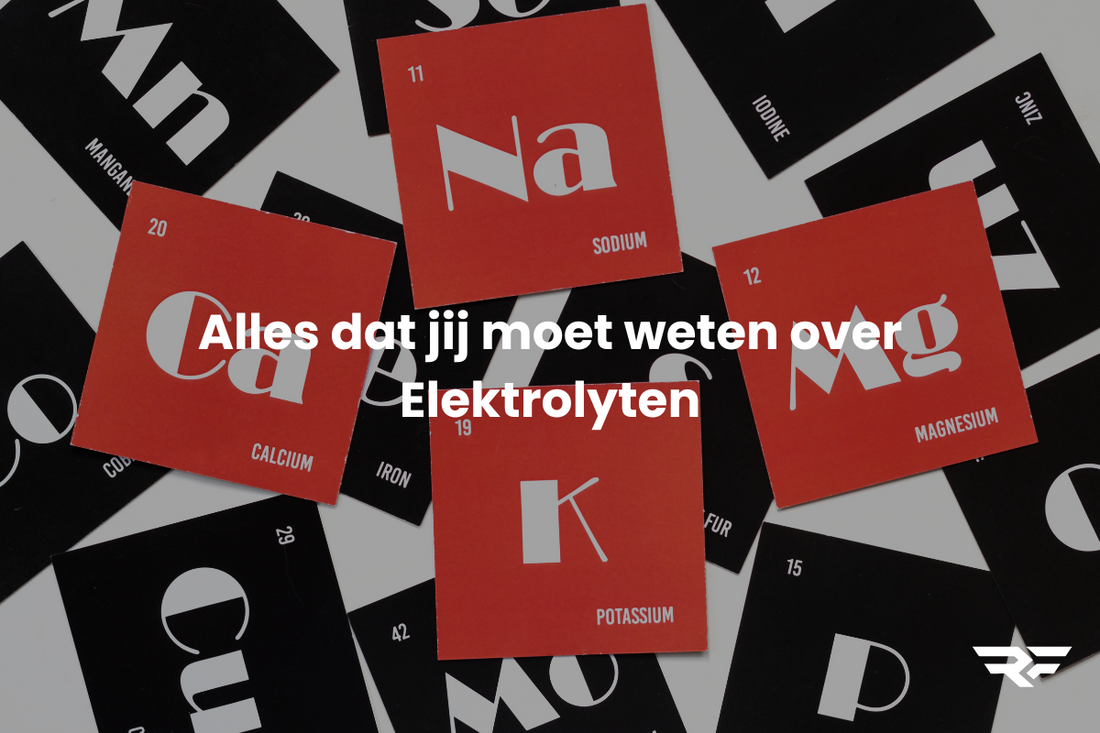
Everything you need to know about Electrolytes
RaveFit, Reading time: 7 minutesShare
Introduction
Electrolytes are essential for the proper functioning of the human body. They support a variety of bodily processes, from muscle contraction to regulating our blood pressure. Although we need electrolytes in small amounts, as micronutrients, deficiencies can quickly affect our energy levels, recovery, and general health.
Whether you’re working out, going to a festival, or just going about your daily tasks, keeping your electrolytes in check can make a big difference. In this blog, we’ll dive into what electrolytes are, what role they play in our bodies, and how to make sure you’re getting enough.
1. What are Electrolytes?
Electrolytes are charged minerals found in your blood, urine, and other body fluids. They fall under the category of micronutrients, meaning we need them in smaller amounts compared to macronutrients like carbohydrates, proteins, and fats.
The major electrolytes are sodium, potassium, calcium, bicarbonate, magnesium, chloride, and phosphorus. These minerals help with a variety of functions, including transporting electrical signals between cells, maintaining healthy fluid balance, and supporting vital organ functions.
2. Main Electrolytes and their Functions
2.1 Sodium – Regulates Blood Pressure and Fluid Balance
Sodium plays a crucial role in regulating blood pressure and maintaining fluid balance in the body. This mineral keeps cells properly hydrated, which is essential for your overall energy levels and health. Too much or too little sodium can lead to dehydration, headaches, or even high blood pressure.
Practical advice: During intensive exercise or high temperatures, choose a sodium-rich drink to support your fluid and electrolyte balance.
2.2 Potassium (Potassium) – Promotes Muscle Contractions and Nerve Functions
Potassium is essential for muscle contraction and nerve impulse regulation. This means that the mineral not only contributes to physical performance, but also plays a major role in the functioning of the heart muscle. A potassium deficiency can cause muscle cramps and fatigue, and an imbalance can delay recovery after exercise.
Practical advice: Bananas, avocados and potatoes are natural sources of potassium and ideal to eat before and after exercise.
2.3 Calcium – Strengthens Bones and Helps Blood Clotting
Calcium is best known for its contribution to strong bones and teeth, but it also plays an important role in blood clotting and muscle function. It supports the movement of muscle fibers and helps transport electrolytes in and out of cells. A calcium deficiency can affect bone health and cause muscle cramps.
Practical advice: Dairy products, almonds and dark green leafy vegetables are rich in calcium and ideal to add to your diet regularly.
2.4 Bicarbonate – Supports Heart Function and pH Balance
Bicarbonate helps maintain the body’s pH balance, which is essential for stable heart function and preventing acidification during intense exercise. When the body becomes too acidic, such as during long efforts, performance can decrease and muscles become weak. Bicarbonate neutralizes excess acid, helping to maintain energy balance.
Practical advice: Bicarbonate can be supplemented with special sports drinks that are aimed at supporting endurance performance and recovery.
2.5 Magnesium – Regulates Blood Glucose and Boosts Immunity
Magnesium is a multifunctional electrolyte that is not only important for energy production, but also contributes to stable blood sugar levels and immunity. It also supports muscle relaxation after exercise, which is crucial for recovery. A deficiency can lead to muscle cramps, fatigue and reduced resistance.
Practical Advice: Nuts, seeds, and leafy greens are excellent sources of magnesium and can be added to your diet daily for optimal recovery and energy.
2.6 Chloride – Supports Digestion and pH Balance
Chloride, often found alongside sodium in table salt, plays a vital role in digestion and maintaining the body’s acidity (pH). It helps form stomach acid, which is needed to break down food. By replenishing chloride, your body supports a healthy balance of acids and bases, which is especially important after intense exercise.
Practical advice: Add a pinch of salt to your drinking water during strenuous exercise to support your chloride balance.
2.7 Phosphorus – Stimulates Tissue Growth and Repair
Phosphorus plays an important role in tissue growth and repair. This mineral also supports energy transport in the body, which is essential for physical performance and everyday energy. Phosphorus is also needed to maintain strong bones and teeth.
Practical advice: Eat fish, poultry, and whole grains regularly to maintain your phosphorus levels and thus support tissue growth and repair.
3. Why are Electrolytes so Important?
Electrolytes are essential for maintaining energy, hydration, and physical performance during intense and long-lasting activities such as sports, festivals, and nights out. During these activities, you quickly lose electrolytes through sweat and exertion, which can lead to dehydration, fatigue, and muscle cramps if not replaced in time. In this section, we look at the benefits of electrolytes specifically for workouts, festivals, and nights out.
3.1 Electrolytes during your Workout
During exercise, your body quickly loses fluid and electrolytes through sweat, especially sodium and potassium. These minerals are crucial for regulating muscle contractions and preventing cramps. When these electrolytes are depleted, your muscles have a harder time contracting and the communication between your nerves and muscles deteriorates. Here are the top benefits of electrolytes during exercise:
- Preventing muscle cramps : Sodium and potassium in particular help support muscle function. Dehydration and electrolyte deficiencies can quickly lead to painful cramps, especially during intense or prolonged workouts.
- Maintaining energy levels : Magnesium and calcium play a role in the production of ATP (adenosine triphosphate), the main energy source for muscles. A deficiency of these minerals can lead to fatigue.
- Optimizing recovery : After a heavy workout, a balance of electrolytes helps the body retain fluid and restore acid-base balance, improving recovery time.
Workout tip : Drink an electrolyte-rich drink before, during or after your workout, especially during long or intense sessions. This helps keep your muscles supple and energized.
3.2 Electrolytes at a Festival: Less Sweating and More Energy
Festivals often involve long days in the sun with lots of movement. This combination makes you sweat faster and therefore lose electrolytes. What you may not know is that good electrolyte levels can help you sweat less. If you get enough sodium and potassium, your body stays better hydrated and doesn’t have to sweat as much to cool you down. Here are the benefits of electrolytes at a festival:
- Prevent dehydration : Sodium and potassium help the body retain water, so you stay better hydrated throughout the day. This means you sweat less, which prevents dehydration.
- More energy and stamina : Magnesium and phosphorus support energy levels and tissue growth and repair, keeping you fit and energetic for longer without getting tired quickly.
- Reduced risk of headaches and dizziness : By maintaining a stable fluid balance and avoiding dehydration, you reduce the risk of typical dehydration symptoms, such as headaches or dizziness, which often occur during festivals.
Festival-goer tip : Drink electrolyte-rich water between sets or take electrolyte supplements in powder form or as effervescent tablets. This will help you stay hydrated and energised without having to sweat too much.
3.3 Electrolytes during a Night Out
When going out, especially when drinking alcohol, you lose fluids quickly because alcohol draws water from your body. This dehydration can lead to a hangover and electrolyte deficiency the next day. Electrolytes can help you recover faster and minimize the negative effects of dehydration. The benefits of electrolytes when going out include:
- Fluid balance and prevention of dehydration : Sodium helps the body retain fluid, while potassium supports fluid balance. This means that your body is less likely to become dehydrated by alcohol, which also helps prevent hangovers.
- Improve brain function and alertness : Magnesium is essential for the functioning of the nervous system and helps support brain function. It makes you feel fresher and more alert.
- Muscle Relaxation and Recovery : If you've been dancing a lot after a long night, electrolytes like magnesium can help relax muscles and promote recovery.
Tip for after a night out : Drink an electrolyte-rich drink before going to bed. This helps to keep your fluid and electrolyte levels in balance, which can help you feel fitter the next morning.
4. Practical Tips for Replenishing Electrolytes
- Practical Tips for Replenishing Electrolytes : Drink electrolyte-rich sports drinks during intense exercise: Look for drinks that contain sodium, potassium and magnesium to support your fluid balance and prevent dehydration.
- Food Sources of Electrolytes : Add electrolyte-rich foods to your diet, such as bananas, nuts, leafy greens, and dairy products, for a natural supplement of essential minerals.
- Powders and Supplements : Electrolyte powders are convenient for on-the-go or during long-term activities. Choose supplements without added sugars for a healthy addition.
- Drink regularly : Prevent dehydration and electrolyte loss by drinking water consistently, especially during hot days and activities involving high physical exertion.
Closure
Electrolytes are not only important for athletes, but for anyone who wants to stay energetic, focused, and healthy. By paying attention to your electrolyte balance, you can better support your body in recovery, fluid balance, and everyday energy. By regularly consuming foods and drinks rich in electrolytes, you can be sure that you get the most out of every activity and optimally support your body.
Follow us on social media for the latest updates and advice.
Sources
- com : "What are Electrolytes?" - Basic Explanation and Benefits of Electrolytes.
- Mayo Clinic : “Electrolytes” – The Importance of Electrolytes for Health and Performance.
- Journal of Sports Science & Medicine : "Role of Electrolytes in Hydration and Performance" - A scientific look at the importance of electrolytes during exercise.
